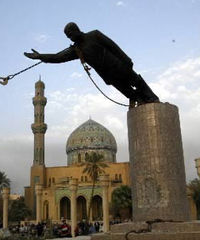The question is not so much whether they do mix, but whether they should mix, such is the potential for rival politicians to extract wildly differing interpretations from the same religious texts.
The most infamous blurring of the lines between the two that has occurred in recent years was when Tony Blair declared that he would “answer to his maker” for joining the US-led invasion of Iraq in 2003.
Looking back, I don’t think he was really saying that God told him to go to war. But what the statement did reveal was that Mr Blair saw a clear moral justification for the decision that derived, at least in part, from his purported Christian values.
In theological terms, the former Prime Minister could point to some fairly heavyweight support for his espousal of the so-called ‘Just War’ theory, however politically inept it was to have expressed it as he did.
No less of an authority than the 39 Articles of the Church of England state: “It is lawful for Christian men, at the commandment of the Magistrate, to wear weapons, and serve in the wars.”
But just as Christian pacifists have always taken issue with this point of view, so too has the question of state welfare versus individual charity been another long-running bone of contention among believers.
And it is this issue that pitched religion back into the spotlight this week, as a group of Church of England bishops attempted to scupper the government’s plans for a £26,000 cap on benefit payments.
The days when the C of E was ‘the Conservative Party at prayer’ are thankfully long gone, although it would probably still be fair to call it the SDP at prayer were it not for the fact that the SDP is also long gone.
So it’s not particularly surprising to see them endorsing what is essentially a social democratic position on welfare, highlighting the ‘bias to the poor’ that is found throughout Scripture and in particular in Jesus’ ministry.
But not all agree. For former archbishop Lord Carey, among others, the country’s £1trillion deficit, and the fecklessness and irresponsibility which he claims the benefits culture rewards, constitute far greater moral evils.
"The sheer scale of our public debt is the greatest moral scandal facing Britain today. If we can't get the deficit under control and begin paying back this debt, we will be mortgaging the future of our children and grandchildren,” he wrote.
The theological arguments will go on – but what about the politics? Well, for my part, I reckon the Coalition has got this about right.
While I am normally quite content to see bishops and other faith leaders attempting to bring a moral perspective to bear on policy-making, on this issue they appear to have seriously misjudged the mood of public opinion.
Establishing a benefits cap at what is around the level of the current average wage will hardly be seen as unfair by the great majority of the population, although admittedly it will hit people disproportionately in London where housing costs are higher.
Even that, though, makes a fairly pleasant change from the disproportionate hit that the North-East and its neighbouring regions have had to sustain as the result of other public sector spending cutbacks.
The bigger political picture here is that, in proposing the benefit cap, the government is seeking not only to tackle the deficit, but also to appeal to a group of voters who are becoming seen by both main parties as the key to electoral success over the next few years.
Gordon Brown used to call them ‘hard working families’ – but they have now become known as the ‘squeezed middle,’ people who are working as hard as ever but whose real incomes have declined significantly over the course of the economic downturn.
The bishops and others will worry – quite rightly – of the risk to social cohesion in focusing attention on relatively middle-class voters at the expense of those at the bottom of the income scale.
But even they might have to concede that continuing to condemn such people to welfare dependency is the surest way to create a permanent underclass.







